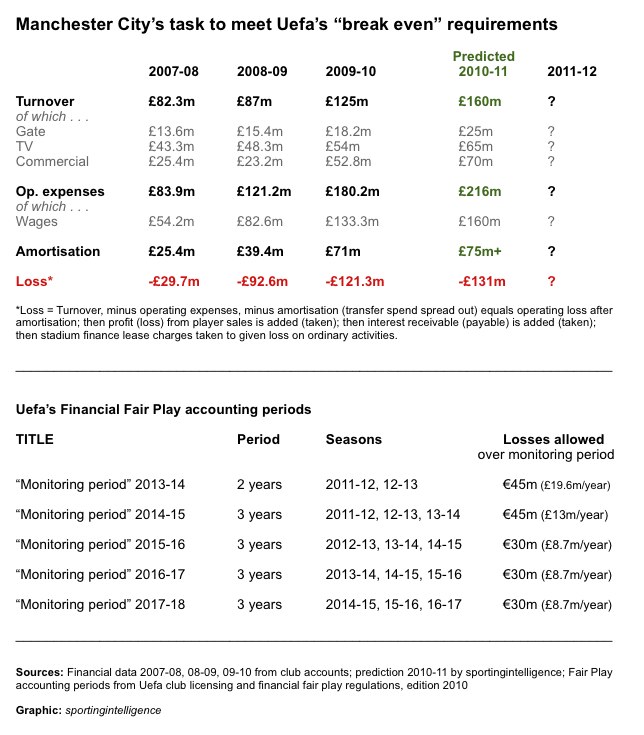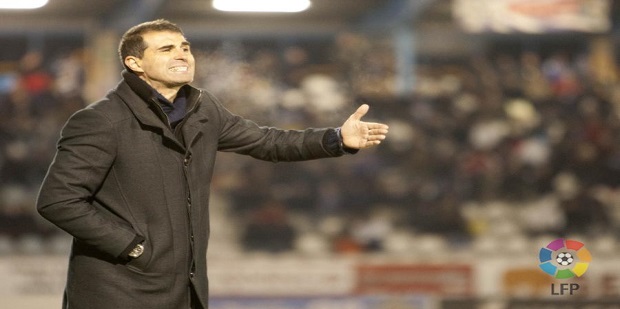- S.D. Eibar ready for maiden La Liga outing
- SD Eibar stengthen ahead of debut La Liga season
- Can ‘Super Mario’ live up to expectations in Madrid?
- MAN IN THE GROUND – Brentford 0 – 4 Osasuna
- Historic Basque derby welcomes S.D. Eibar to La Liga
- Munich to Madrid, via Brazil – Tony Kroos
- Rakitic in Spanish Switch
- Can Spain find redemption in Rio?
- Viva Espana! A season of redemption for Spanish football
- From the old to the new: who can fill the void in years to come for La Roja?
Breaking Down Financial Fair Play: ‘Breaking Even’
- Updated: 17 July, 2011
By Jamie Halden
A wholly honest policy put in place by Platini and his very own ”solutions committee” no doubt, but how effective is the legislation that Platini has put in place under his executive mandate at UEFA? I have had the latest Financial Fair Play regulatory guidebook lying around my computer for months without delving into the colossal stack of legalese/accounting terms and regulations which lie inside.
The purpose and intent on UEFA’s part is simple, to stop the naughty owners/chairman/directors at Football Clubs from putting clubs into serious difficulty financially as we have seen with Mallorca/Valencia/Roma/Portsmouth to name but a few of the clubs across Europe, who’s past mismanagement has encumbered current/future progress both on the pitch and off it with staggering debts and in some extreme cases, liquidation/administration.
So there can be no doubt that the intentions of Platini and his board at UEFA are entirely pragmatic and honest to stop the way current clubs are run which in essence is taking the clubs away from the fans/communities and putting them in the hands of creditors/owners who take out ridiculous non sustainable loans to buy/run European football clubs and in some cases jump ship straight after after they see the first glint of profit. The regulations have met criticism but the mainstream opinion seems to be that these mystery ”FFP” regulations will change the game for the better and stop the current trend football is going which is debt driven and essentially too many people taking short term success over long term longevity.
Alot of people will discard this as another Platini ”populist policy” which lacks substance and credibility, like so much of UEFA legislation, with this brain child of his being nothing more than a grand narcissistic gesture to define his UEFA presidency and gain him votes politically within FIFA as ”the man who fixed football”. But this is no easy task, in fact nor is it popular amongst a select few ECA members who have an advantage to be gained from the continuation of short-medium term goals and financial strategy and discard the idea of long term sustainability by European football clubs.
I will admit I myself is often a critic of UEFA and their seemingly never ending array of ”cock ups” in relation to club football and the absurd idea of adding an extra 2 pair of eyes/opinions to goal line matters which makes no logical sense at all unless they are Hawkeye robots dressed as officials. But he has taken on the ‘big clubs’ as him and his general secretary like to describe it, the crusade for longevity they say and the way it will help small clubs and their fans through sustainable growth. Critics will argue this keeps the big clubs big and makes the small clubs smaller, whats UEFA’s response? ”Go open a shop in Africa would be a start”. But that is the stereotype of FFP and the idea that it is a UEFA elitist policy threatening the growth/challenge of clubs like Manchester City but I would argue that in fact long term sustainability should be put above any immediate success which I am sure Portsmouth fans will agree with.
Reading through the regulations I noticed key phrases throughout which were ”fair”, ”reasonable” and ”relevant” which despite welcoming that UEFA have not put fixed figures/limits on clubs balances/declarations of commercial revenue it did get me wondering whether this was not reminiscent of a UN resolution diplomatically worded with the intent from one side of ‘stretching’ the boundaries. And let’s not forget the ECA were pivotal in coming up with FFP details and how to keep it ”fair”, I know what your thinking; why would UEFA let the chairman write their own will? Good question, I am guessing its so they could make this regulation seem fair on the clubs/owners but still extremely strict on the surface. It’s like a teacher telling their pupils to do their homework and if they don’t there will be grave implications/punishments when in reality they get an extension or a small 1 hour detention for their blatant disregard for rules meaning the other pupils will look and see how lenient it has been on that pupil and they see no reason to do their homework in time and so the cycle continues…
Annex X of the legislation defines the way UEFA deems the clubs balance sheet to have broken even; It’s calculated through comparing relevant income to non relevant expenses, here is what is defined as relevant income:
a) Gate Receipts Revenue
b) Sponsorship And Advertising Revenue
c) Broadcasting Rights Revenue
d) Commercial Activities
e) Other Operating Income
f) Profit On Disposal Of Player Registrations (Or Income Of Disposal Of Player Registrations)
g) Excess Proceeds On Disposal Of Tangible Fixed Assets
h) Finance Income
Relative income from any of the above methods is decreased if they are deemed to be:
i) Non Monetary Credits
j) Income Transactions With Related Parties Above Fair Value
k) Income From Non-Football Operations Not Related to The Club
So essentially the last 3 clauses are crucial in determining a clubs relative income and even more crucial is the enforcement of FFP in general, from UEFA who under these terms should not show any lenience with clubs in regards to disregarding the relative income outlined and therefore anyone who is deemed to have gained income from any one of those 3 methods should have that money disregarded from any break even calculation…Right? The income from Non-Football Operations clause takes out the possibility of Owners simply putting in money directly as some of them do now as it will be disregarded by UEFA and not taken into account when calculation of FFP comes around.
Relevant expenses:
a) Cost Of Sales/Materials
b) Employee Benefits Expense
c) Amortisation/Impairment Of Player Registrations And Loss On Disposal Of Player Registrations (Or Costs Of Acquiring Player Registrations)
d) Other Operating Expenses
e) Finance Costs And Dividends
Relative Expenses Will Be Increased If Any Of The Elements Of a)-e) Include:
a) Expense Transaction (s) With Related Party (ies) Is Below Fair Value
Therefore in theory the Relevant Expenses will be calculated taking into account b) annual wages of all employees c) Buying of players/Loss on selling a player d) operating expenses such as scouting for example e) shareholder/board payments and costs of Finance at the club. So theoretically this legislation will take into account all relevant variables when calculating break even points/analysing club balances. And the clause is basically if any clubs are owned/affiliated closely enough that an owner can transfer money from one club to another by acquiring a player, so that far fetched idea some people had has been kicked into the long grass by UEFA straight away. On the surface it appears water tight and you are probably wondering that in the current transfer market climate why clubs are spending 30+ million on players? Well this is essentially the last year you can do that without risk of being in immediate danger of non compliance, and as I will describe in my next piece on this analysing another Annex to the legislation about how transfer fees are factored in because it’s not as straight forward as it may appear.
Task Ahead For Clubs Like Manchester City To Comply With The Relevant Regulation To Break Even;

Part 1 of a series of pieces analysing the Legislation behind UEFA’s Financial Fair Play regulations.
Follow @icentrocampista







You must be logged in to post a comment Login